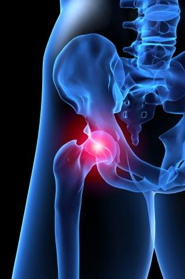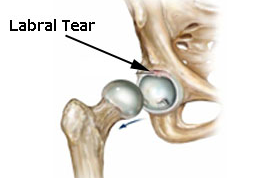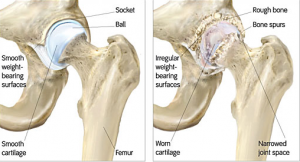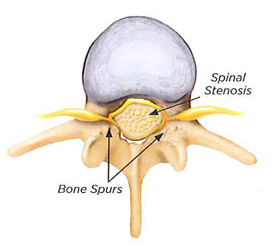When a person has pain in his or her hip, It may be coming from the hip joint itself or possibly one of the areas surrounding it. It may even be coming from a source in the low  back, and often times the history and physical will help to establish that.
back, and often times the history and physical will help to establish that.
What Causes Hip Pain In Younger Patients?
Often times, there is a distinction between hip pain in somebody who is younger versus over the age of 60. In the younger age group, hip pain may be coming from a soft tissue injury such as a cartilaginous tear of the labrum. A labral tear is more often seen in athletes and may involve an aching pain, popping or clicking of the hip joint, or at times a sharp pain.
A plain x-ray will not help for the diagnosis of a labral tear, but an MRI will often show it. It may be necessary for the physician to order the MRI with contrast injected into the joint.
An overlap between the younger and older age groups with hip pain is pain from arthritis. If a person has congenital hip dysplasia or had Perthes disease as a child, it often leads to premature arthritis. After a traumatic injury of the hip, post-traumatic arthritis may set in within a few years.
a person has congenital hip dysplasia or had Perthes disease as a child, it often leads to premature arthritis. After a traumatic injury of the hip, post-traumatic arthritis may set in within a few years.
In most cases, treatment involves conservative options if at all possible unless the elective decision is made to have a hip replacement.
The younger the person is when the hip replacement is performed, the more likely the chance of a revision being necessary at some point during life.
Call (602) 507 – 6550 to schedule your Appointment TODAY!

What Causes Hip Pain in Older Individuals?
In the older age group, most of the time the pain is due to degenerative arthritis. The person may also have rheumatoid arthritis, and that can cause pain throughout the lower extremity joints.
As humans age, they continue to make cartilage at the same levels as before. However, they begin to lose cartilage at a faster rate and that is how degenerative arthritis develops. In response to that, the hip joint space can deteriorate, bone spurs may develop and range of motion may be limited and painful.

What Kind of Treatments are Available for Degenerative Hip Arthritis?
Typical nonsurgical treatment for degenerative hip arthritis includes anti-inflammatories and Tylenol, Physical Therapy and/or Chiropractic treatment. Weight loss may help take pressure off of the hip and reduce pain or injections into the hip of cortisone or maybe hyaluronic acid.
These injections may provide months of pain relief at a time and delay or prevent the need for a total joint replacement.
How is Hip Pain Properly Diagnosed?
It is important to ensure that when a person is having hip pain, that pain is actually coming from a hip problem. Spinal stenosis in the lumbar spine can pinch on nerve roots and radiate pain into a person’s hip. It can masquerade as hip joint pain. It may take an injection of numbing medicine into the hip itself to see if pain is relieved to figure this out.
from a hip problem. Spinal stenosis in the lumbar spine can pinch on nerve roots and radiate pain into a person’s hip. It can masquerade as hip joint pain. It may take an injection of numbing medicine into the hip itself to see if pain is relieved to figure this out.
In younger individuals, a disc herniation at the lower lumbar levels may refer pain into the hip area as well. Pain outside the hip joint is often due to trochanteric bursitis which is an inflammation of the soft tissue overlying the muscles on the outside of the hip joint.
What are Additional Causes of Hip Pain Besides Arthritis?
Less common causes of hip pain include infection, tumor or fracture. When the person is experiencing fevers, night sweats, chills or significant pain at rest, the physician will perform appropriate imaging studies and blood work to help see if one of these are present.This may include blood cultures and maybe a biopsy. 
When a patient has a potential hip fracture, one may need an MRI if there is no displacement of the fracture to confirm its presence. Usually these are due to osteoporosis in older individuals.
If you or a loved one is experiencing hip pain, the pain doctors at Arizona Pain Specialists are experts in the nonoperative treatment of all hip problems. These Arizona pain centers offer medications, physical rehab, acupuncture, chiropractic and interventional pain procedures.
Call (602) 507 – 6550 to schedule your Appointment TODAY!

![]()


 back, and often times the history and physical will help to establish that.
back, and often times the history and physical will help to establish that. a person has congenital hip dysplasia or had Perthes disease as a child, it often leads to premature arthritis. After a traumatic injury of the hip, post-traumatic arthritis may set in within a few years.
a person has congenital hip dysplasia or had Perthes disease as a child, it often leads to premature arthritis. After a traumatic injury of the hip, post-traumatic arthritis may set in within a few years.
 from a hip problem. Spinal stenosis in the lumbar spine can pinch on nerve roots and radiate pain into a person’s hip. It can masquerade as hip joint pain. It may take an injection of numbing medicine into the hip itself to see if pain is relieved to figure this out.
from a hip problem. Spinal stenosis in the lumbar spine can pinch on nerve roots and radiate pain into a person’s hip. It can masquerade as hip joint pain. It may take an injection of numbing medicine into the hip itself to see if pain is relieved to figure this out.